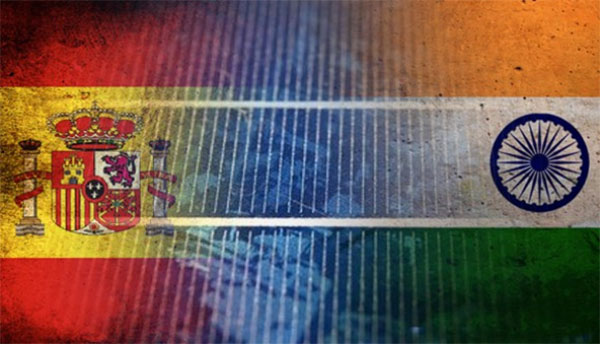Original version in Spanish: La proyección actual de España en la India: imagen y relaciones políticas.
Introduction
(1.1) The study’s objectives and methodology
This working paper forms part of an Elcano Royal Institute initiative aimed at analysing Spain’s relations with key Asian countries. The initiative unfolds in the context of the region’s growing importance on the international stage, especially in the political and economic spheres.
The absence of a strong national image in the most important Asian capitals, a lack of awareness of the technological and commercial capabilities of the most internationally-inclined Spanish companies and the traditionally low profile of political relations: these are the hurdles Spain must overcome in order to foster a new dynamic in its relations in this region. The Spanish government, aware of the importance of the challenge, announced via the Ministry of Foreign Affairs and Cooperation its Asia-Pacific Framework Plans in the year 2000. Successive versions of these plans have coordinated government efforts to increase Spanish presence and visibility in the region, seeking new ways to underpin Spain’s image and performance in a part of the world that has brighter prospects than any other.
The aim of this Elcano Royal Institute initiative is to contribute to the debate on the position Spain occupies in Asia and the space that should be given to the Asian dimension in Spanish foreign policy, with special focus on ties with key countries in the region. In such a context, the aim of this working paper is to present a series of proposals to improve Spain’s image in India and cement a new era in bilateral political relations.
This working paper is divided into three main parts: an introduction concerning India’s importance as an object of interest for Spanish foreign and economic policy, followed by two longer sections focusing on Spain’s image in India and political relations between the two countries.
The paper is based on the author’s own personal knowledge of the Indian scene and relations between the two countries,[1] backed up by reference to the most recent literature on these issues and in particular by a field study involving personal interviews and questionnaires undertaken with diplomats, civil servants, politicians, business people, academics, journalists and representatives of non-governmental organisations, both in India and Spain. The author would like to express his gratitude to all those who have shared their valuable time and knowledge with him in recent months, and in particular all those who have read early versions of this text and put forward suggestions and ideas for its improvement. They have all contributed in a decisive way to the development of this working paper.
(1.2) The 60th anniversary of the establishment of diplomatic relations between Spain and India and the challenge of cementing a new era
In July 1988 the then Prime Minister of India, Rajiv Gandhi, paid a three-day state visit to Spain. Over the course of the visit he expressed his admiration for Spain’s political and economic evolution since the democratic transition and tried to convince his Spanish interlocutors, among them the leader of the government, Felipe González, to strengthen trade links, to set up mechanisms for political cooperation in such areas as the fight against terrorism and to encourage knowledge transfer in fields such as tourism and the process of European regional integration.
The Indian delegation was extremely interested in fostering greater commercial exchange and improving political relations with Spain. Alfred Gonsalves, the Indian Secretary of State for Foreign Affairs, told El País newspaper during the visit that ‘the political weight that Spanish democracy has acquired in the international arena in recent years means it cannot afford to continue neglecting India in its diplomacy’. On a more sceptical note, other members of the Indian Prime Minister’s delegation were quoted in the same newspaper as saying that relations between Spain and India were good, but only ‘because they don’t exist’.[2] Despite the clear interest expressed by India and the fine words and good intentions on both sides, the visit did not produce any meaningful results and relations continued being ‘good’, albeit practically non-existent, in subsequent years.
Almost three decades later, however, the global importance India has attained from an economic and political perspective has brought about a very different scenario vis-à-vis the bilateral relationship. The Asian country’s growth has aroused enormous interest on the part of other players on the international stage, including Spain, eager to deepen and extend diplomatic and commercial relations; now the constant stream of diplomatic missions beating a path to New Delhi wanting to gain the attention of its government and business leaders and strike deals with the new Asian giant are invariably high-level delegations.
From the Indian point of view, Spain continues to be a relatively unknown country in the south of Europe playing a very minor role in its foreign affairs, although comparable to the role played by other States in the region such as Italy and the Netherlands. It is crucial to bear this in mind because it makes the relationship asymmetrical: India is highly attractive to Spain and the vast majority of European countries, which, fundamentally for economic reasons, are extremely interested in improving relations with New Delhi over the short and medium terms.
From the Spanish perspective it is also important to locate this situation in the context of a key dilemma for Spain’s foreign policy in the 21st century. On the one hand, Asian countries such as India do not form part of the ‘hard core’ or, by extension, the traditional priorities of Spain’s foreign policy, which since the advent of democracy has focused on Europe, Latin America and North Africa. They do, however, make up part of the most economically and politically vibrant region in the world at the moment, a phenomenon that is forecast to continue over the short and medium term. As Mario Esteban, Senior Asia-Pacific Analyst at the Elcano Royal Institute explains, ‘the great problem of Spanish foreign policy towards Asia is the serious imbalance between the resources that are assigned to the region and what is at stake for Spain. There is no greater imbalance anywhere else in the world, hence the pressing need to increase the Spanish presence in Asia’.[3]
One possible response to this dilemma involves a realistic approach that manages existing resources from a strategic and qualitative point of view, prioritising innovative and high-impact proposals. Mario Esteban cites a clear example in this regard: it makes little sense to keep 10 consulates open in France while Indian cities as important as Kolkata (formerly Calcutta), Chennai (formerly Madras) and Bangalore lack Spanish diplomatic representation.
Independently of their position on the political spectrum, successive Spanish governments since the start of the century have tried, within the framework of the Asia Pacific plans, to abandon this bilateral dynamic with India characterised by lack of awareness and a low level of relations. A series of initiatives have been developed in the last decade to usher in a new era in bilateral relations that would overcome what the Spanish Prime Minister, José Luis Rodríguez Zapatero, referred to in his state visit to New Delhi in July 2012 as ‘courteous mutual ignorance’. The setting up of such institutions as Casa Asia, with offices in Madrid and Barcelona, and Casa de la India in Valladolid, the inauguration of the Instituto Cervantes in New Delhi and the Spain-India Market Plans drawn up by the Secretary of State for Trade all exemplify this strategy.
The Spanish government’s new, more active and more ambitious approach to this important bilateral relationship cannot be understood without the pressure that has emanated from private enterprise. Its development was at first preceded and then accompanied by growing involvement in India on the part of many large and medium-sized Spanish companies. The trade and investment figures have increased significantly from a very low base and there is great potential for the expansion to continue. Since 2009, the Spain-India Council Foundation, an institution set up by the Ministry of Foreign Affairs and Cooperation with the participation of more than 40 private entities to foster bilateral relations, has exemplified public-private cooperation in this arena and the interest of the Spanish business community in the commercial and investment opportunities India represents for their companies.
As a landmark in this phase of rapprochement, the Spanish government, working in cooperation with its Indian counterpart, is seeking to give a symbolic flavour to 2016 by commemorating the 60th anniversary of the establishment of bilateral relations between the two countries. Spain recognised India as a sovereign state following her independence in 1947, but full diplomatic relations were not established until nine years later, in November 1956. The anniversary is an ideal opportunity for the Spanish government to mark this new era of relations with India with a series of special events; it is hoped that these will include a visit to Spain by the Prime Minister, Narendra Modi, as part of an as yet unconfirmed European tour next year.
Indeed it was Prime Minister Modi’s rise to power in mid-2014, with an ambitious programme of reforms and opening up to the outside world, which has provided fresh impetus to strengthening bilateral ties. Modi secured an historic electoral victory with a campaign focused on changing the Indian economic model from the traditional priority placed on the tertiary and services sector to one based on encouraging export industries, with significant investment in infrastructure, the energy sector and urbanisation, bringing it closer into line with the paradigm of East Asia. The positive GDP growth figures for the third quarter of 2014, in the region of 7.5%, have given an impetus to this new economic course, in which inflation has also fallen to 5.1% and the current account deficit is below 2% of GDP.
The reform programme presents Spain with an additional opportunity to strengthen its economic ties with India, because Spain has internationally-leading companies in the development of infrastructure and renewable energies, to highlight two key sectors for India. One of the overriding priorities of the Modi government is to improve infrastructure so as to avoid inadequate provision creating a bottleneck that in turn prevents the attainment of development targets, something that happened under the previous, Congress-led government. There are some striking shortfalls at the outset: major investment is needed in the electricity system, both in transport and in distribution, in wind and solar power, in modernising the railway network, ports and airports, in extending the road network and in reinforcing urban public services (drinking water, refuse collection and treatment, sewage systems, and so on). Spain and India need to take advantage of this context to work together. The next two sections of this paper seek to point the way to such cooperation by making proposals for improving Spain’s image in India and developing bilateral political relations.
Rubén Campos
Programme Coordinator at Club de Madrid and expert on South Asia
[1] The author has written the following publications in the field of Spanish-Indian bilateral relations: Rubén Campos Palarea (2008), ‘Una nueva etapa política para España en la India’, Fundación Alternativas, Madrid; Rubén Campos Palarea (2012), ‘La India emergente como asignatura pendiente de la política exterior española’, ARI, nr 64/2012, Elcano Royal Institute; and Rubén Campos Palarea (2014), ‘Histórica victoria electoral de Modi abre un nuevo ciclo político en la India’, ARI, nr 28/2014, Elcano Royal Institute.
[2] Georgina Higueras (1988), ‘España tiene que llenar el vacío indio, asegura el secretario de Exteriores de Rajiv Gandhi’, El País, 18/VII/1988.
[3] Mario Esteban (2014), ‘Asia-Pacífico: el mayor desequilibrio de la política exterior española’, ARI, nr 10/2014, Elcano Royal Institute.



